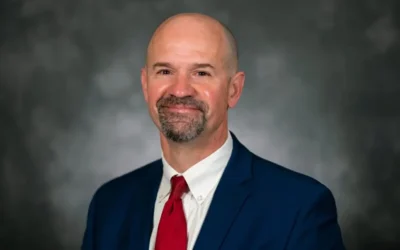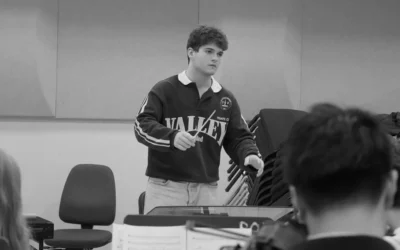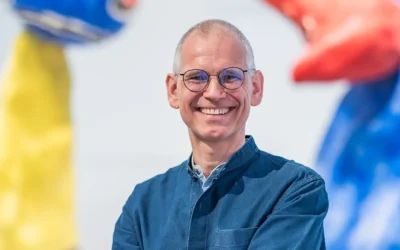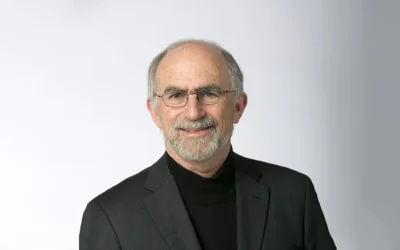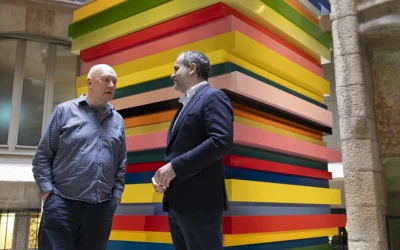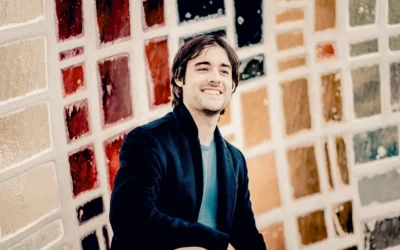Ricard Gili: “Jazz music has values that make it a very special kind of music”
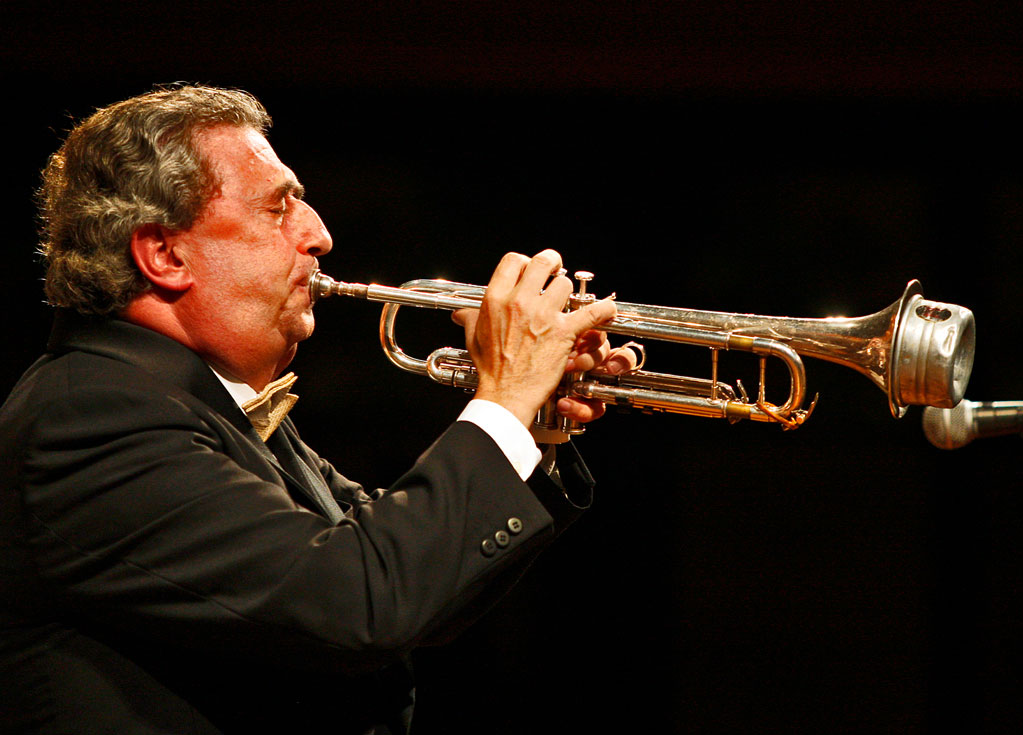
Ricard Gili is a retired architect and sees himself as a jazz fan. He has dedicated a large part of his life to studying and promoting jazz music, and for 50 years he was a member and the director of the Locomotora Negra, an amateur Catalan jazz group founded in 1971 in which he made a name for himself as a trumpet player.
Where does this passion for jazz come from?
The passion was instilled in me by my father, Joaquim Gili who was also an architect. He had been a fan of jazz since before the war, and since we were very little my brothers and I would share in his listening to jazz. There is no way I could ever thank him enough for that. This went on until the moment we realized that jazz was something special and different. That was the period of the Beatles, the Shadows, the Animals…
The place we spent summers, Calella de Palafrugell, was also important. In 1962, a French pianist, Jimmy Rena, and his wife, Mano Rena, who played guitar, opened a spot called La Guitarra. There they formed a trio with a drummer and played jazz. My father took an interest in the group and became friends with them. They would come to our house in the afternoon, listen to records, and comment on them. I must have been about fifteen years old when I, along with my brothers, became part of that world. We got a subscription to the newsletter of the Hot Club in France, a magazine that was edited by Hugues Panassié, who was among that group of Frenchmen that frequented our house.
At our home in Barcelona, my father organized listenings of jazz records on Sunday morning. He called them the Locomotora Negra (“Black Locomotive”) sessions, and each session brought larger and larger groups of listeners.
So even before you were 20 years old you were already a serious jazz aficionado. When did you begin to spread your passion?
I had begun to hold conferences on jazz, but it was once the group, La Locomotora Negra, had been put together that the pianist, Tòfol Trepat, who was an art history teacher at the high school, suggested that we do a seminar on jazz for his students. That must have been about 1972 or 73. The seminar lasted the full academic year, and was a couple of hours a week. Those seminars then extended and lasted 10 years in what has since become the site of the Fundació Catalana de Jazz Clàssic (Catalan Foundation for Classic Jazz). After that, I did a couple more seminars at the Institut d’Estudis Nord-americans, which was aimed at a different kind of audience.
What is it about jazz music that draws you in?
Jazz has certain values that attract me, principally, musical values. The rhythm that drives jazz, what we call the swing, has an agility, a flexibility and a dynamism that is different and far more appealing than the more forceful or “macho” style that was common in rhythms of the music of that period. The spontaneity, the warmth, the feeling that the musicians put into the music reached the listener much more. That is what got me hooked: the rhythmic element. However, there was another very interesting part, which was the way these musicians played their instruments. It was in no way academic. It followed no set rules or regulamentation. Instead, each musician played in their own way, using their own technical resources and physical abilities to express themselves in a very personal way. You could recognize each musician by how they interpreted the music. In classical music you recognize the author, while in jazz music you recognize the interpreter.
But beyond that, from a sociological point of view, something that I have seen over the years is that we, as Europeans or as in Western Civilization in general, have tended to make a division between what is popular and what is cultured. What is popular is generally looked down upon, and it is clear that with the rise of consumerism, the music aimed at the masses has certainly lowered the bar. While on the other hand it is believed that good music, what is truly culture is made for a small number of people, for an elite. I recognized the absurdity of this dichotomy between quality and popularity when I got to know jazz. One could create music as exalted as that of Louis Armstrong, Duke Ellington or Art Tatum, that was also popular. Jazz shattered that false dilemma between quality and popularity. That was what reeled me in, and indeed has been useful to me in many other fields of my life.
You are a great defender of classic jazz. What is it that makes you cringe about more contemporary jazz?
In the later evolutions of jazz, these values that we have been discussing got diluted. The rhythm, the spontaneity, the agility, the warmth in how the instruments are played, that expressivity that is so direct, is all being lost. Those values that most enriched our music, those that were furthest from our prior concepts of music, have been disappearing. There has been an attempt to convert jazz into the music of an elite, which reproposes the dichotomy between quality and popularity. Some have moved towards jazz-rock, making it more popular with a wider audience but decreasing the quality from the point of view of jazz, while others have made it something more intellectual and tend to make music for a far more restricted group of listeners.
In 2006, you decided to found the Fundació Catalana de Jazz Clàssic.
One of the jobs of this foundation that I am honored to chair, is to give a chance to a series of musicians, starting with those that are here, who have a lot to say and who play jazz styles that are greatly different from one another. We want them to have the opportunity to play, and for people to be able to listen to them in optimal conditions. We offer this opportunity by helping in the scheduling of jazz cycles at the Institut d’Estudis Nord-americans, at the Centre Moral de Gràcia and other locations, as well as the summer program in the space that so inspired me in my youth, La Guitarra Jazz Club in Calella de Palafrugell. We also host conferences. It is our job to promote a form of music that we believe does not receive the attention it deserves from the media.
Since the very beginning the Institut d’Estudis Nord-americans scheduled concerts, conferences, and other activities related to the world of jazz. How long has they been working with the Fundació Catalana de Jazz Clàssic?
The first event that we organized together with the IEN was a benefit concert in 2006. It was just after the disaster caused by Hurricane Katrina. A group from New Orleans came to play at the Institut d’Estudis Nord-americans in order to collect funds. All proceeds went to the musicians. We even published a CD: The Spirit of New Orleans. Live in Barcelona 2006.
In Barcelona there are fans: there are several spots and festivals for jazz.
To some extent, like the rest of Europe. Maybe France or England have a more solid base, they have been able to keep historical spots open, such as the Caveau de la Huchette in Paris that opened at the end of the 40’s. It is a place that has always played classic jazz and they have kept the authentic, original feeling of the jazz ambience.
There has not been so much tradition here. Granted there have been clubs that try to maintain a certain continuity, but they are few in number. The Jamboree had to close up at the end of the 60’s, then it reopened in the 90’s, but you cannot claim that Barcelona has had an intense day to day life of jazz.
And for the festivals, they are going to be more concerned with the poster, with bringing in big names to draw in the public, regardless of whether or not they are jazz musicians. That is the harsh reality. The lack of forums where jazz is performed on a daily basis means that young people who are good, or even very good, cannot find anywhere to play. The situation is not particularly optimistic, as there are more musicians than there are chances to play.
